- Home
- Penelope Lively
Pack of Cards Page 13
Pack of Cards Read online
Page 13
And the child is borne away by the headmaster's wife. She never touches him or tells him to come, but simply bears him away like some relentless tide, down corridors and through swinging glass doors, towing him like a frail craft, not bothering to look back to see if he is following, confident in the strength of magnetism, or obedience.
And delivers him to a room where boys are scattered among inky tables and rungless chairs and sprawled on a mangy carpet. There is a scampering, and a rising, and a silence falling, as she opens the door.
‘Now this is the Lower Third, Charles, who you'd be with if you come to us in September. Boys, this is Charles Manders, and I want you to tell him all about things and answer any questions he wants to ask. You can believe about half of what they say, Charles, and they will tell you the most fearful lies about the food, which is excellent.’
The boys laugh and groan; amiable, exaggerated groans. They must like the headmaster's wife: there is licensed repartee. They look at her with bright eyes in open, eager faces. Someone leaps to hold the door for her, and close it behind her. She is gone.
The child stands in the centre of the room, and it draws in around him. The circle of children contracts, faces are only a yard or so from him; strange faces, looking, assessing.
Asking questions. They help themselves to his name, his age, his school. Over their heads he sees beyond the window an inaccessible world of shivering trees and high racing clouds and his voice which has floated like a feather in the dusty schoolroom air dies altogether and he becomes mute, and he stands in the middle of them with shoulders humped, staring down at feet: grubby plimsolls and kicked brown sandals. There is a noise in his ears like rushing water, a torrential din out of which voices boom, blotting each other out so that he cannot always hear the words. Do you? they say, and Have you? and What's your? and the faces, if he looks up, swing into one another in kaleidoscopic patterns and the floor under his feet is unsteady, lifting and falling.
And out of the noises comes one voice that is complete, that he can hear. ‘Next term, we'll mash you,’ it says. ‘We always mash new boys.’
And a bell goes, somewhere beyond doors and down corridors, and suddenly the children are all gone, clattering away and leaving him there with the heaving floor and the walls that shift and swing, and the headmaster's wife comes back and tows him away, and he is with his parents again, and they are getting into the car, and the high hedges skim past the car windows once more, in the other direction, and the gravel under the tyres changes to black tarmac.
‘Well?’
‘I liked it, didn't you?’ The mother adjusted the car around her, closing windows, shrugging into her seat.
‘Very pleasant, really. Nice chap.’
‘I liked him. Not quite so sure about her.’
‘It's pricey, of course.’
‘All the same …’
‘Money well spent, though. One way and another.’
‘Shall we settle it, then?’
‘I think so. I'll drop him a line.’
The mother pitched her voice a notch higher to speak to the child in the back of the car. ‘Would you like to go there, Charles? Like Simon Wilcox. Did you see that lovely gym, and the swimming-pool? And did the other boys tell you all about it?’
The child does not answer. He looks straight ahead of him, at the road coiling beneath the bonnet of the car. His face is haggard with anticipation.
At the Pitt-Rivers
THEY'VE GOT this museum in Oxford, called the Pitt-Rivers; I spend a lot of time there. It's a weird place, really weird, stuff from all over the world crammed into glass cases like some kind of mad junk-shop – native things from New Guinea and Mexico and Sumatra and wherever you like to think of. Spears and stone axes and masks and a thousand different kinds of fish-hook. And bead jewellery and peculiar musical instruments. And a great totem from Canada. You can learn a lot there about what people get up to: it makes you think. Mostly it's pretty depressing – umpteen different nasty ways of killing each other.
I didn't start going there to learn anything; just because it was a nice quiet place to mooch around and be on my own, Saturdays, or after school. It got to be a kind of habit. There aren't often people there – the odd art student, a few kids gawping at the shrunken heads, one or two serious-looking blokes wandering around. The porter's usually reading the Sun or having a snooze; there's not a lot of custom. The Natural History Museum is a bigger draw; you have to go through that to get into the Pitt-Rivers. You'll always get an audience for a dinosaur and a few nasty-looking jellyfish in formalin. Actually I'm partial to the Natural History Museum myself; that makes you think, too. All those fossils, and then in the end you and me. I had a go at reading The Origin of Species last term, not that I got very far. There's a room upstairs in the museum where Darwin's friend – Huxley – had this great argument with that bishop and the rest of them. It says so on the door. I like that, it seems kind of respectful. Putting up a plaque to an argument, instead of just JOE SOAP WAS BORN HERE or whatever. It should be done more often.
It was in the Natural History Museum – underneath the central whale – that I first saw her, and since my mind was on natural selection I thought she wasn't all that good an example of it. I remember thinking that it was funny it doesn't seem to operate with girls, so you got them getting prettier and prettier, because good-looking girls have a better deal than bad-looking ones, you've only got to observe a bit to see that. I always notice girls, to see if they're pretty or not, and she wasn't. She wasn't specially ugly; just very ordinary – you wouldn't look at her twice. She was sitting on a bench, watching the entrance.
All the girls I know – at school or round where I live – are either attractive or they're not. If they're attractive they have lots of blokes after them and if they're not they don't. It's as simple as that. If they're attractive just looking at them makes you think of all sorts of things, imagine what it would be like and so forth, and if they're not then it doesn't really occur to you, except in so far as it occurs to you a good deal of the time, actually. This girl was definitely not attractive. In the first place she was in fact quite old, not far off thirty, I should think, and in the second she hadn't got a nice figure; her legs were kind of dumpy and she didn't have pretty hair or anything like that. I gave her a look, just automatically, to check, and then didn't bother with her.
Until I came alongside, where I could see her face clearly, and then I looked again. And again. She still wasn't pretty, but she had the most beautiful expression I've ever seen in my life. She glowed; that's the only way I can put it. She sat there with her hands in her lap, watching the door, and radiating away so that in a peculiar fashion it made you feel good just to look at her, a bit like you were joining in how she felt. Stupid, I daresay, but that's how it was.
And I thought to myself: oh ho … I mean, I've seen films and I've read books and I know a bit about things.
As a matter of fact I've been in love myself twice. The first time was with a girl in my class at school and I suppose it was a bit of a trial run, really, I mean I'm not altogether sure how much I was feeling it but it seemed quite important when it was going on. The second time was last year, when I was fifteen. She came to stay with her married sister who lives round the corner from us and though it's months and months ago now I still feel quite faint and weak when I go past the house.
Oh ho, I thought. I felt kindly – sort of benign – and a bit curious to see what the bloke would be like. I thought he couldn't be much because of her not being pretty. I mean, in films you can always tell who's going to fall for who because they'll be the two good-lookers and while I'm not saying real life's like that there is a way people match each other, isn't there, you've only got to look round at married people. Let me hasten to say that I'm not all that good-looking myself, only about B+. Not too bad, but not all that marvellous either.
But he didn't show up and I wanted to get on into the Pitt-Rivers, so I left her there, waiting. What
I haven't said is that one of the things I go to the Pitt-Rivers for is to write poetry. I write quite a lot of poetry. I could do it at home – I often do – and it's not that I'm coy or anything, my parents know about it and they're quite interested, but I just like the idea of having a special place to go to. It's quiet there, and a bit odd like I've said, and nobody takes any notice of me.
Sometimes I feel I'm getting somewhere with this poetry, and other times it looks to me pretty awful. I showed a few poems to our English master and he was very helpful: he said what was good and pointed out where I'd used words badly, or not worked out what I was thinking very well, so that was quite encouraging. He's a nice bloke. I like his lessons. He's very good at explaining poetry. I mean, I think poetry's amazingly difficult: sometimes you read a thing again and again and you just can't see what the hell the person's getting at. He reads all sorts of poetry to us, our English master, and you really get the hang of it after a bit – hard stuff like Hopkins and The Hound of Heaven, and Donne. He read us some of those Donne poems about love the other day which are all very explicit and I must say first time round I hadn't quite got the point – ‘Licence my roving hands …’ and so forth – but he wasn't embarrassed or anything, our English master, and when you realise that it's not geography he's talking about, the poet, then as a matter of fact I think that poem's lovely. I got a bit fed up with the way some of my mates were sniggering about it, being all-knowing; truth to tell I doubt if they know any more than I do, it's all just show. And that's a beautiful poem: I mean, if anything makes it clear that there's nothing wrong about sex, that poem does, they ought to make it compulsory reading for some people.
Anyway, I went on into the Pitt-Rivers and I was up on the first floor, in a favourite corner of mine among the arrow-heads, when I saw her again, and I must say I got quite a shock. Because the man with her was an old bloke: he was older than my father, fiftyish and more, he must have been at least twenty years older than her. So I reckoned I must have made a mistake. Not that at all.
They were talking, though I couldn't hear what they were saying because they were on the far side of the gallery. They stopped in front of a case and I could see their faces quite clearly. They stood there looking at each other, not talking any more, and I realised I hadn't made a mistake after all. Absolutely not. They didn't touch each other, they just stood and looked; it seemed like ages. I don't imagine they knew I was there.
And that time I was shocked. Really shocked. I don't mind telling you, I thought it was disgusting. He was an ordinary-looking person – he might have been a schoolmaster or something, he wore those kind of clothes, old trousers and sweater, and he had greyish hair, a bit long. And there was she, and as I've said she wasn't pretty, not at all, but she had this marvellous look about her, and she was years and years younger.
It was because of him, I realised, that she had that look.
I didn't like it at all. I got up, from where I was sitting, with quite a clatter to make sure they heard me and I went stumping off out of the museum. I wasn't going to write any more poetry that day, I could see. I went off home and truth to tell I didn't really think much more about them, that man and the girl, mainly because of being rather disgusted, like I said.
A couple of weeks later they were there again. They were on the ground floor, at the back, by the rush matting and ceremonial gear for with-it tribesmen, leaning up against a glass case that they weren't looking into, and talking. At least he was talking, quiet and serious, and she was listening, and nodding from time to time. I was busy with some thinking I wanted to do, and I tried not to take any notice of them; I mean, they were neither here nor there as far as I was concerned, none of my business, though I still thought it was a bit creepy. I couldn't see why, frankly. You fancy people your own age, and that's all there is to it, is what I thought. What I'd always thought.
So I ignored them, except that I couldn't quite. I kept sneaking a look, every now and then, and the more I did the more I felt kind of friendly towards them; I liked them. Which was a bit weird considering they didn't know I even existed – they certainly weren't interested in me – so it was a pretty one-sided kind of relationship. I thought he seemed like a nice bloke, whatever you thought about him and her and all that. It was something about the way he smiled, and the way he told her things (not that I ever heard a word they said, I wasn't eavesdropping, not ever, let's be quite clear about that) that made her look interested and say things back and so on. I thought it was obvious they liked talking to each other, quite apart from anything else. I thought that was nice.
I only took out that girl I mentioned – the one who came to stay with her sister – once, and as a matter of fact we couldn't find much to talk about. I was still in love with her – no doubt about that – but it was a bit sticky, I don't mind admitting. In fact I was quite glad when it was time to take her back to her sister's. In many ways the best part was just thinking about her.
Every time I looked at the girl – the Pitt-Rivers one, that is – I found myself imagining what it must be like being able to feel that you've made someone look like that. Radiant, like she was. Which is what that bloke must have been able to feel. I found myself putting myself in his place, as it were, and wondering. I've done a lot of wondering about things like that – everybody does, I suppose – but mostly it's been more kind of basic. Now, I began to think I didn't really know anything. Looking at those two – watching them, if you like – was a bit like seeing something go on behind a thick glass window, so it was half removed from you. You could see but not hear, hear but not touch, or whatever. I could see, but I didn't know.
I suppose you could say I was envious, in a funny kind of way. I don't mean jealous in that I fancied the girl, or anything like that. As I've said already, she wasn't pretty, or even attractive. And I wasn't envious like you might be envious of someone for being happier than you are, because I'm not specially unhappy, as it happens. I think I was envious of them for being what they were – as though one fossil creature might be envious of a more evolved kind of fossil creature, which of course is a stupid idea.
When I was in the Pitt-Rivers again I looked for them, quite deliberately, but they weren't there. I was disappointed, though I pretended to myself it really didn't matter. I wondered about why they went there in the first place; I mean, people have to meet each other somewhere but why there? It doesn't exactly spring to mind as a romantic spot. I supposed there were reasons they didn't want to meet somewhere obvious and public: maybe he was married, I thought, or maybe she was, even. I wondered if that was the only place they met, or did they have others. Once walking through the botanical gardens, I found myself looking for them in the big glasshouses there.
I know the inside of the Pitt-Rivers pretty well by now. Considering it's not anthropology or ethnology or whatever I went there for in the first place, it's quite surprising what a lot I could tell you about the things people believe and do. Primitive people, that is – what the Pitt-Rivers calls primitive people. And I think it's all very sad, actually: sad because it's like children, not understanding how things work and getting it all wrong, and carving each other up because of it a lot of the time. It does actually make you feel things get better – wars and bombs and everything notwithstanding. Nobody wants to go on being a child all their lives.
I was thinking about this – looking at a case full of particularly loony stuff to do with witchcraft – when I saw them again. At least I saw her first, standing by the totem with her hands in her coat pockets, and I didn't have to look at the door to know he'd arrived: her face told you that. He came up to her and gave her a kind of hug – arm round her shoulders and then quickly off again – and they wandered away up the stairs, heads together, talking.
I didn't follow them; it had been nice to see them again, and know they were there, and that was it. I was busy on a poem I'd been writing and unpicking and rewriting for some time. It was a poem about an old man sitting on a bench in a park and gettin
g into conversation with a boy – someone around my age – and they swap opinions and observations (it's all dialogue, this poem, like a long conversation) and it's not till the end you realise they're the same person. It sounds either corny, or pretentious, I know; and what I could never decide was whether to have it as though the old man's looking back, or the boy's kind of projecting forward – imagining himself, as it were. So I went on fiddling about with this, and didn't really think much about the man and the girl, until I saw it was latish and there was no one else in the museum except me and some feet on the wooden floor of the gallery overhead, walking round and round, round and round. Two pairs of feet. They'd been doing that for ages, I realised; I'd been hearing them without registering.
I saw them go past – just their heads, above the glass cases – and something wasn't right. They weren't talking. She had her arm through his, and she was looking straight in front of her, and when I saw her face I had a nasty kind of twinge in my stomach. Because she was miserable. Once, she looked at him, and they both managed a bleak sort of smile. And then they walked on, round the gallery again, and next time past they still weren't talking, just holding on to each other like that, like people who're ill, or very old. And then the attendant rang the bell, and I heard them come down the stairs, and they came past me and went out into the Natural History Museum.

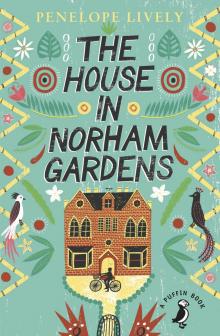 The House in Norham Gardens
The House in Norham Gardens Family Album
Family Album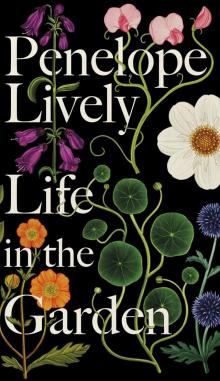 Life in the Garden
Life in the Garden Oleander, Jacaranda: A Childhood Perceived
Oleander, Jacaranda: A Childhood Perceived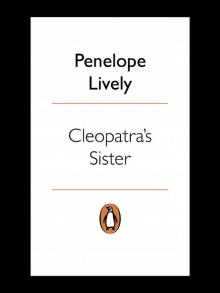 Cleopatra's Sister
Cleopatra's Sister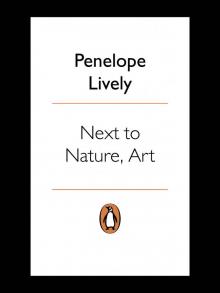 Next to Nature, Art
Next to Nature, Art A Stitch in Time
A Stitch in Time Moon Tiger
Moon Tiger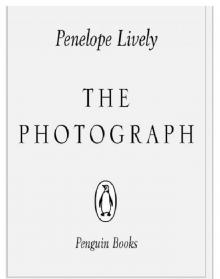 The Photograph
The Photograph Heat Wave
Heat Wave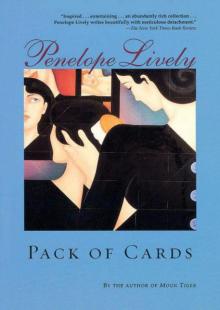 Pack of Cards
Pack of Cards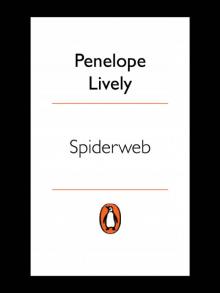 Spiderweb
Spiderweb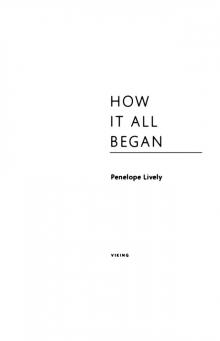 How It All Began
How It All Began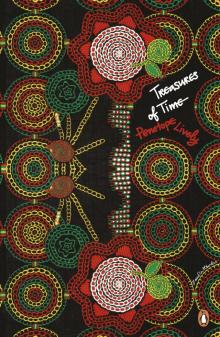 Treasures of Time
Treasures of Time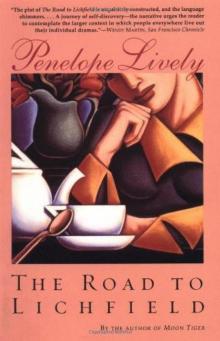 The Road to Lichfield
The Road to Lichfield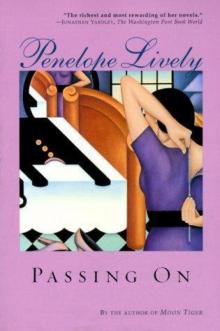 Passing On
Passing On Making It Up
Making It Up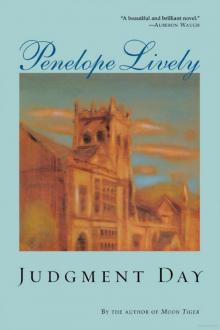 Judgment Day
Judgment Day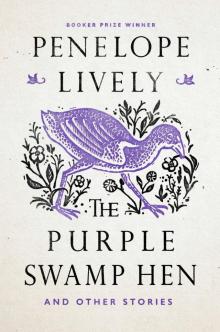 The Purple Swamp Hen and Other Stories
The Purple Swamp Hen and Other Stories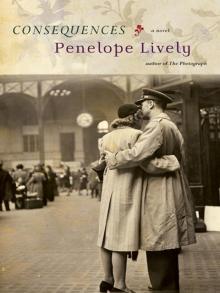 Consequences
Consequences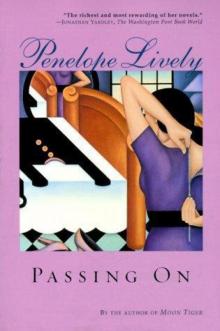 *****Passing On*****
*****Passing On*****